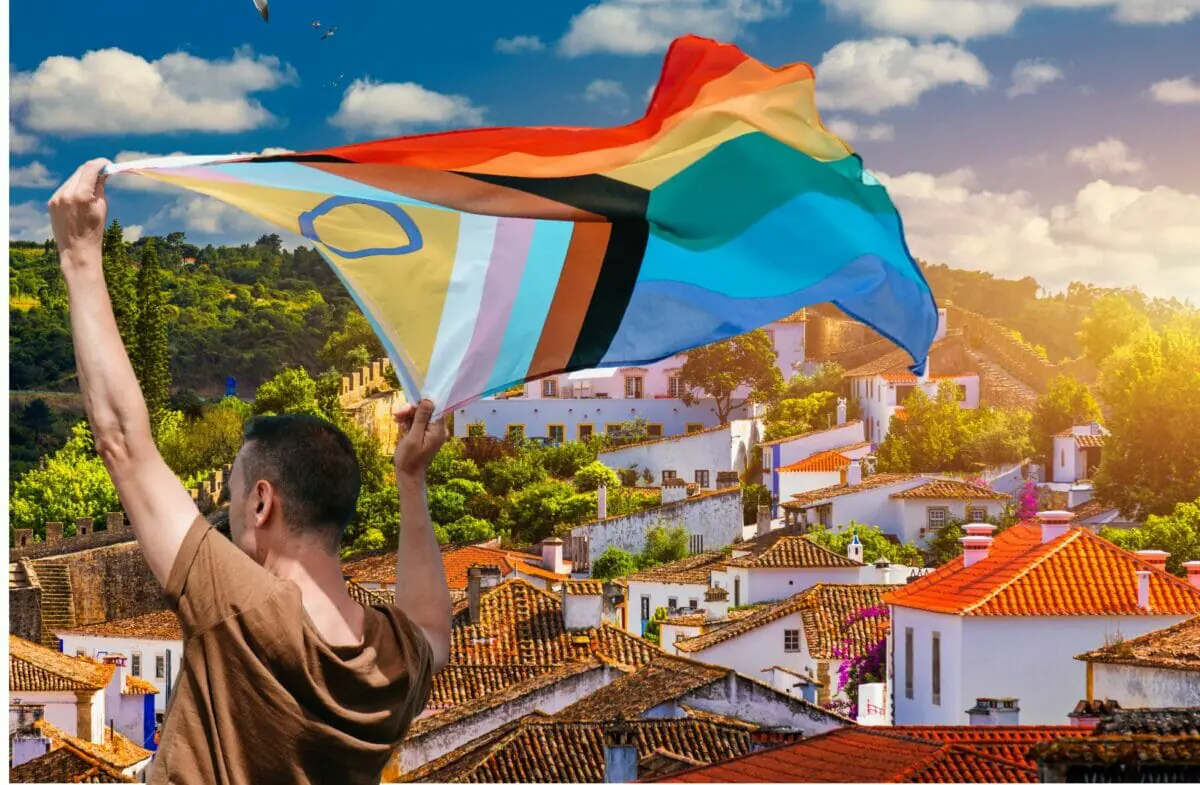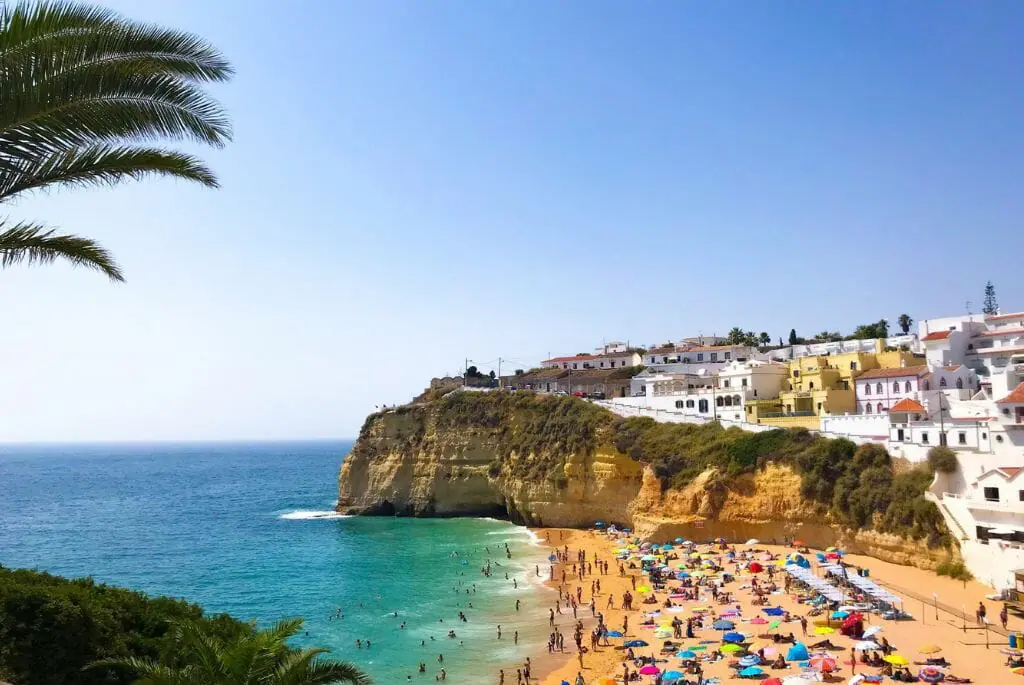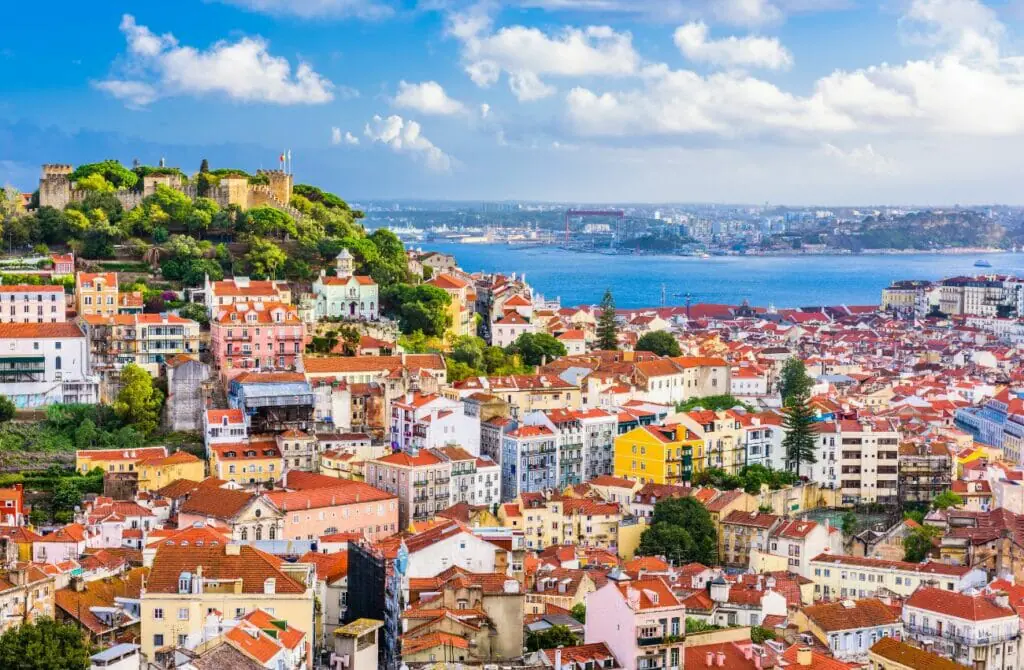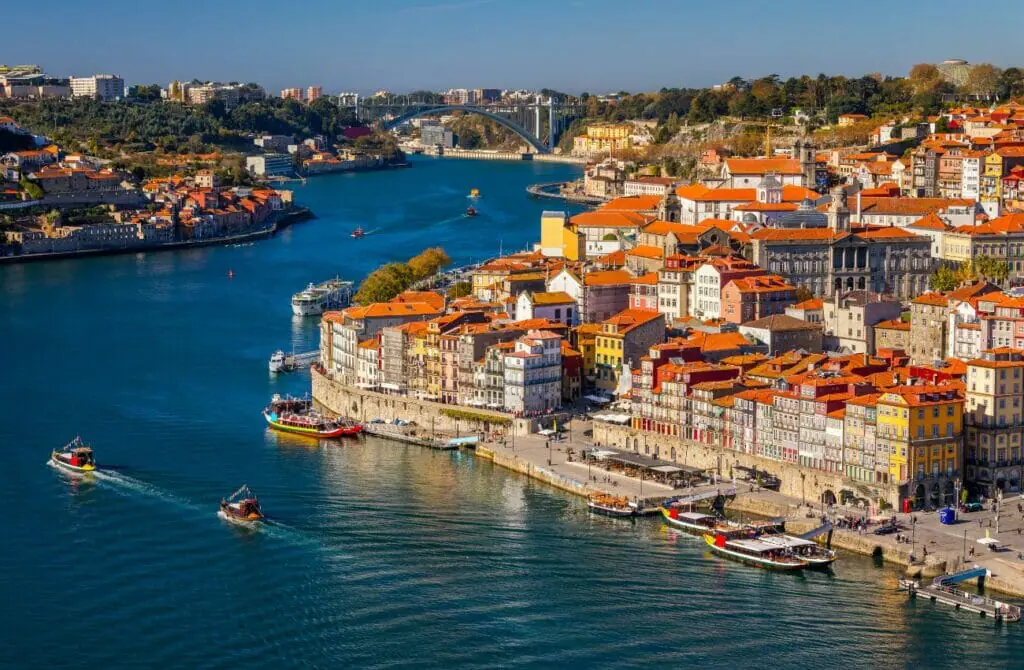Ah, Portugal! With its sun-drenched coastlines, historic cobblestone towns, and soulful Fado melodies, it’s no wonder this corner of Iberia has become a must-visit for globe-trotters. But peel back the layers, and you’ll find that Gay Portugal is an ever-blossoming bouquet of acceptance, vibrant scenes, and heartening tales of resilience.
Having transitioned from a nation under a conservative dictatorship to one that champions LGBTQ+ rights, Portugal’s journey is nothing short of inspirational. Gay Portugal has become a bastion of progress in Southern Europe, setting itself apart with its sweeping decriminalization laws in the 80s, recognition of same-sex unions in the early 2000s, and, ultimately, the proud legal embrace of gay marriages in 2010.
From the pulsating nightlife of Lisbon‘s Bairro Alto to Porto‘s burgeoning queer scene and the sun-soaked festivities of Algarve’s Pride events, Gay Portugal promises an effervescent cocktail of experiences for every kind of traveler.
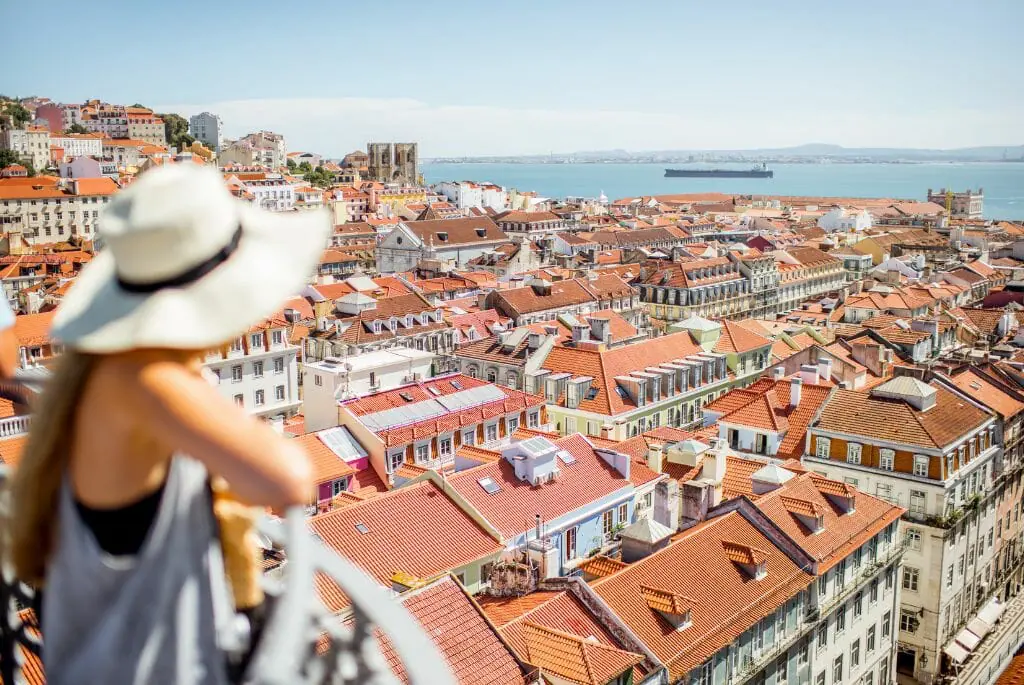
Every tavern, club, and beach seems to hum with energy, welcoming all to join in the fiesta. The nation’s nightlife is not just about the dance and dazzle but also serves as a testament to the enduring spirit of its LGBTQ+ community, who once had to veil their identities but now celebrate them under the glittering lights.
Yet, beyond the parties and the parades, it’s the everyday narratives of Gay Portugal that truly resonate. Stories of elderly couples who witnessed the nation’s transformation and tales of young love blossoming in the alleys of Sintra—these chronicles of joy, pain, resistance, and triumph form the backbone of Portugal’s queer legacy.
In essence, what makes Portugal magnetic isn’t just its scenic beauty or historic charm but its soul—a soul that champions love in all its forms. From its political victories to its lively streets and the heartfelt stories of its citizens, Gay Portugal stands as a shimmering beacon for LGBTQ+ travelers, inviting them to explore, celebrate, and, most importantly, feel at home.
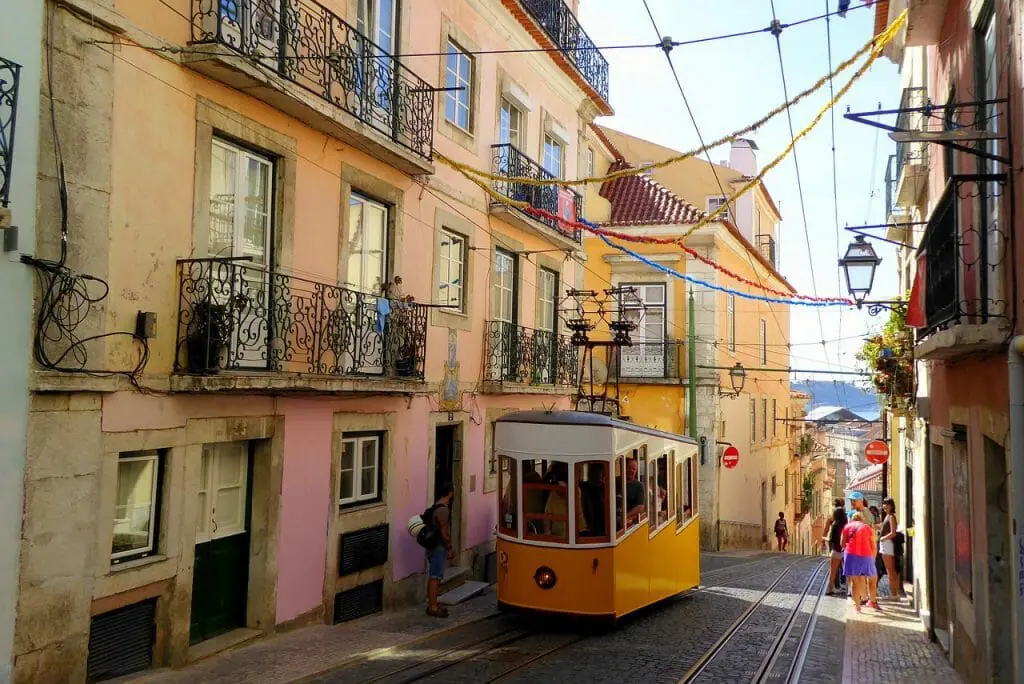
History Of LGBT Rights In Portugal
The history of LGBT rights in Portugal begins with the Carnation Revolution in 1974, a pivotal moment that transformed the nation from a military dictatorship to a democracy. This revolution initiated a series of progressive changes, which eventually led to the decriminalization of homosexuality in 1982. Before this, same-sex sexual activity was considered a criminal offense, punishable under the dictatorship’s strict laws.
Following the decriminalization of homosexuality, the Portuguese LGBT community became more vocal and organized, leading to the establishment of the country’s LGBT movement in May 1974. This movement gained momentum, and in 1999, the first gay pride march took place in Lisbon. In the same year, the state officially recognized same-sex unions, granting legal rights to these couples.
Over the years, the Portuguese Parliament has continued to enact various laws aimed at ensuring equal rights for the LGBT community. For instance, gay marriage became legal in Portugal in 2010. Furthermore, in 2015, Parliament approved several proposals regarding adoption rights for same-sex couples, as well as access to IVF treatments. Today, discrimination based on sexual orientation and gender identity is illegal in Portugal, both in the employment and housing sectors.
While the Portuguese government has made significant strides in ensuring LGBT rights and protections, it is crucial for members of the LGBT community and tourists alike to remain vigilant and stay informed of the current situation.
Local LGBT advocacy groups work constantly to promote and protect the rights of the community and can provide valuable advice and support. It is also essential to recognize that situations may change rapidly, and information can become outdated. Therefore, consulting with trusted sources and staying up to date on developments is crucial to ensure safety and well-being.
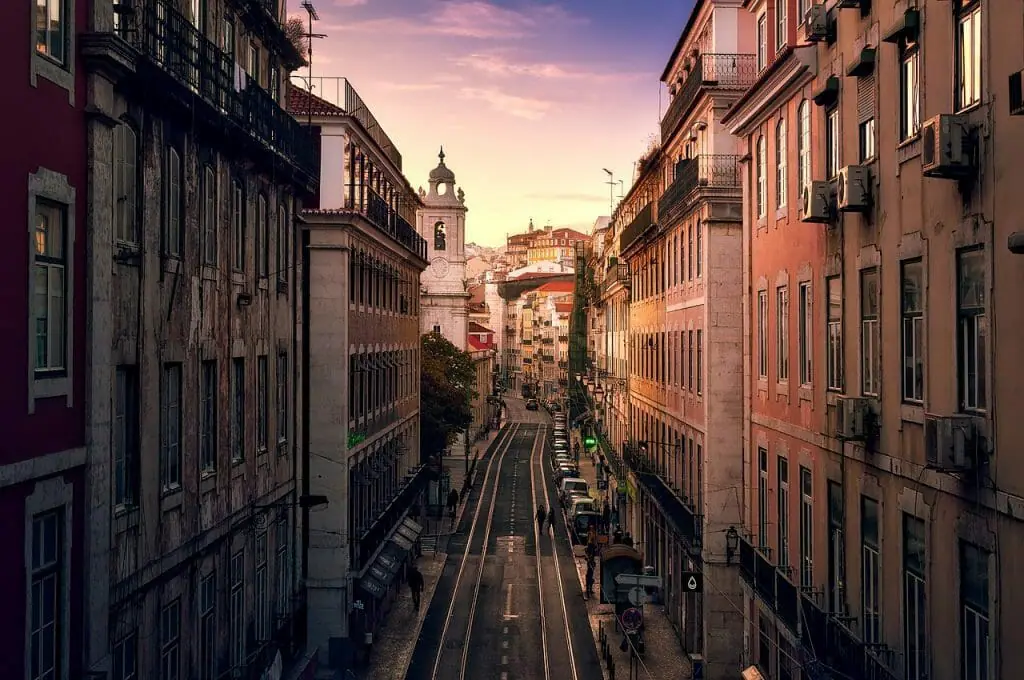
The LGBT Legal Situation In Portugal
Portugal has made significant strides in establishing legal protections and rights for its LGBT citizens. Homosexuality is legal in the country, and anti-discrimination laws have been put in place to protect individuals based on their sexual orientation and gender identity. Same-sex marriage was legalized in 2010, granting same-sex couples legal recognition and the same rights as heterosexual couples.
In addition to marriage rights, same-sex couples in Portugal have been granted the right to adopt children since March 1, 2016. This gives equal adoption rights to all couples, regardless of their sexual orientation.
With regards to gender identity, Portuguese law allows individuals to legally change their gender without the requirement of surgery. However, non-binary gender recognition is currently not legally recognized in the country.
It is essential for both locals and tourists to be aware of their rights and protections under Portuguese law. While the country has made commendable progress in LGBT rights, it is crucial to remain vigilant as situations can change, and some individuals may hold discriminatory views. Moreover, information can become outdated, so it is imperative to seek current advice before traveling or making decisions based on legal protections.
There are several LGBT advocacy groups in Portugal, such as ILGA Portugal and Rede ex aequo, which provide support and information regarding LGBT rights and issues. Connecting with these organizations can be helpful for individuals seeking up-to-date information or support during their stay in the country.
In conclusion, Portugal has established a strong legal framework to protect and grant rights to its LGBT citizens. However, it is important for individuals to be aware of their rights, stay informed, and remain cautious as situations may change.

The LGBT Social Situation In Portugal
In Portugal, Lesbian, Gay, Bisexual, and Transgender (LGBT) people have gained significant legal rights and social acceptance in recent years. However, despite the progressive laws, the cultural landscape for LGBT people varies across the country.
Portugal decriminalized homosexuality in 1982 and has since established anti-discrimination laws, legalized same-sex marriage in 2010, and allowed adoption by same-sex couples since 2016. The country also offers legal gender change without the requirement for surgery. These advancements reflect an increasing acceptance of the LGBTQI+ community within Portuguese society.
Nevertheless, public opinion and experiences may differ, particularly between the capital city of Lisbon and other regions. Lisbon is known for its vibrant nightlife, with various nightclubs and gay bars concentrated in the districts of Bairro Alto and Principe Real. The city hosts an annual Gay Pride festival called Pride in Lisbon, attended by both locals and tourists.
Porto, Portugal’s second-largest city, also has a thriving LGBT community. Pride in Porto is an annual event, similar to Pride in Lisbon, celebrating the diversity and acceptance of the LGBT community. The Algarve region, popular among expats and tourists, is considered LGBT-friendly, with a growing number of establishments catering to this community.
However, while the legal situation and urban environments may be welcoming, it’s essential to remember that attitudes can vary. Homophobia and transphobia still exist in Portugal, as they do in any country. Public opinion surveys, such as the Eurobarometer, indicate that a proportion of the population holds negative opinions on LGBT rights. Additionally, Portugal commemorates the National Day Against Homophobia and Transphobia, acknowledging the need to address these issues.
To ensure a safe and enjoyable experience, LGBT travelers and residents should stay informed about the current situation and be aware of their surroundings. It’s always important to be vigilant and considerate of local customs and attitudes, as the situation can change, and there are always bad actors in every country.
In case of need support or information, there are several LGBT advocacy groups in Portugal that can help, such as ILGA Portugal and Variações – Associação de Comércio e Turismo LGBTI de Portugal. These organizations work to promote and protect the rights of the LGBT community in the country, and they can provide valuable resources and assistance when necessary.

Trans Rights In Portugal
Transgender rights in Portugal have been progressive in recent years. People are allowed to change their gender legally without the requirement of surgery. This has made Portugal only the sixth European nation to permit a change of gender without medical or state intervention. However, it is important to note that non-binary gender recognition is not yet legally recognized in the country.
Discrimination based on gender identity and sexual orientation is illegal in Portugal. Despite this legal protection, societal views in some areas tend to reflect homophobia and transphobia. It is important for both locals and tourists to remain vigilant and be aware that situations can change, so seeking current advice before traveling is recommended.
The cities of Porto and Lisbon are considered LGBT-friendly, with a vibrant LGBTI community and annual Pride parades. Pride in Lisbon and Pride in Porto are popular events that draw locals and visitors from around the world to celebrate diversity and raise awareness of LGBT rights. The Algarve region also offers a supportive environment for the community.
In Portugal, the age of consent is set equally for heterosexual and homosexual relationships, further establishing the country’s progressive stance on LGBT rights.
LGBTI advocacy groups, such as ILGA Portugal, play a significant role in promoting equal rights and providing support services to the community. These organizations work towards eliminating discriminatory laws and practices, ensuring a safer environment for LGBT people in Portugal.
While Portugal has taken significant steps in protecting transgender rights and promoting inclusivity, it is crucial for individuals to be aware of potential risks and remain cautious. Overall, the country remains a progressive destination for the LGBT community, reflected in their legal framework and social attitudes in major cities like Porto and Lisbon.


The Future For The Queer Community In Portugal
As Portugal continues to progress in terms of LGBT rights, the future looks promising for the local community and tourists alike. The country already has a reputation for being a pioneer in LGBT rights, with legislation prohibiting discrimination based on sexual orientation and gender identity. Legal same-sex marriage and adoption rights for same-sex couples further solidify Portugal’s commitment to equality for all its citizens, regardless of their sexual orientation or gender identity.
Portugal’s major cities, such as Lisbon and Porto, have become hotspots for the LGBT community, thanks to the vibrant nightlife in neighborhoods like Bairro Alto and Principe Real. Pride parades in Lisbon and Porto continue to grow in scale and support each year, championing acceptance, love, and diversity. Local advocacy groups, such as ILGA Portugal, work tirelessly to advance LGBT rights and raise awareness about homophobia and transphobia.
Despite these advancements, it is essential for both locals and tourists to remain vigilant and aware that situations can change quickly, and information may become outdated. It is always advised to seek current information and guidance before traveling. As in any country, there could be individuals who perpetuate hate, and steps should be taken to protect oneself when necessary.
At the international level, Portugal is committed to LGBT rights as a member of both the European Union and the United Nations. By upholding international human rights standards, Portugal is actively participating in the global conversation on advancing LGBT rights and challenges that arise in different contexts.
The future for LGBT rights in Portugal appears to be moving in a positive direction, with increased visibility and acceptance. As the nation continues to uphold its progressive stance in European politics and international human rights, the impact on local communities and beyond is bound to be felt, paving the way for a more inclusive society.
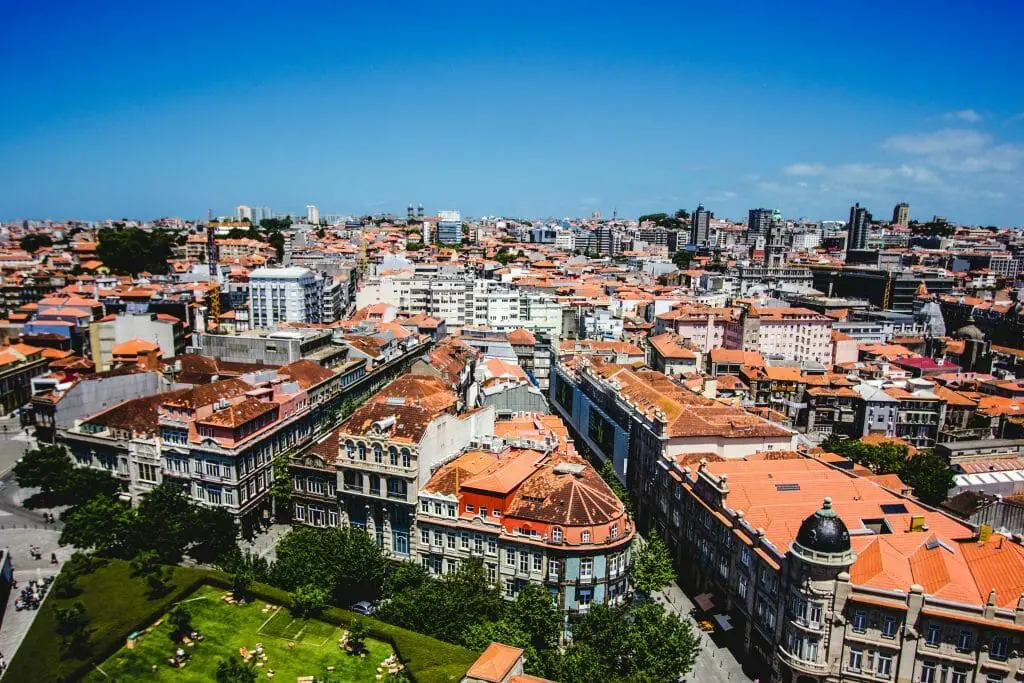
Protect Yourself While Travelling In Gay Portugal
While Portugal is generally considered an LGBT-friendly country with legal protections in place, it is important for both locals and tourists to be aware of potential risks and take necessary precautions.
Discrimination based on sexual orientation and gender identity is illegal in Portugal, and there are anti-discrimination laws and hate crime laws in place. Nevertheless, isolated incidents of homophobia, transphobia, and domestic violence can still occur. As a result, it is essential for individuals to remain vigilant and seek current advice before traveling or attending events.
To protect yourself, consider connecting with local LGBT advocacy groups in Portugal, such as ILGA Portugal, which can provide valuable information on safe spaces and events. Additionally, when exploring public places like Sauna Camoes or attending wine tastings, it is advisable to stay in groups and avoid putting oneself in potentially risky situations.
Furthermore, keep in mind that legal rights and protections may vary depending on specific circumstances and regions within Portugal. To better understand your rights and the local context, familiarize yourself with the country’s Constitution, Parliament’s decisions, and the United Nations’ recommendations on human rights.
Despite Portugal’s progress in promoting LGBT rights, it is essential to remember that situations can change quickly, and outdated information might not accurately reflect the present context. Always seek updated information on rights, safety, and available resources before making decisions.
In conclusion, while Portugal offers a welcoming environment for the LGBT community, taking precautious measures and staying informed can help ensure a safe and enjoyable experience for all.


Best Gay Destinations In Portugal
Greetings, intrepid explorers! When it comes to European gems that meld rich history with pulsating queer scenes, Lisbon undeniably tops the charts. A city where every cobblestone and azulejo-tiled façade tells tales of centuries past, intertwined with the laughter and resilience of the LGBTQ+ community.
As we chart the best gay destinations in Lisbon, it becomes evident that Gay Lisbon is more than just a destination; it’s a living, breathing tapestry of culture, acceptance, and undeniable flair.
In our curated guide, you’ll notice we’ve chosen to present these fabulous spots in alphabetical order. This is not a mere listing but a celebration, honoring each locale’s unique allure and contribution to the radiant spectrum of Gay Lisbon.
Whether it’s the bars, clubs, or cultural haunts, each shines on its own merit, waiting for travelers like you to savor without the confines of hierarchical ranks. Dive into this Portuguese paradise, and let Lisbon’s LGBTQ+ spirit sweep you off your feet!
Darlings, if you haven’t let the sun-kissed charms of Gay Faro envelop you yet, you’re missing a page from your luxe travel diary! This coastal beauty isn’t just about serene beaches and historic allure; its under-the-radar LGBTQ+ scene brims with warmth and vivacity, making every night an intimate fiesta. Trust me; Gay Faro isn’t just a stopover; it’s an embrace that lingers, ensuring you leave with a heart full but still yearning for just one more dance under the Algarve moon.
Gay Lisbon is Europe’s unsung queer mecca that’s ready to snatch your wigs and hearts! This dazzling jewel of a city seduces you by day with its iconic seven hills and eclectic cultural sights, only to transition into a queer nightlife goddess, brimming with an array of gay bars, cutting-edge drag shows, and sultry saunas—all wrapped in an atmosphere of acceptance that even the gay capitals of Europe would envy. Trust me, you’ll be feeling your oats in Lisbon, and, quite frankly, why wouldn’t you?
Fasten your seat belts and prepare to be swept off your feet by the allure of Gay Porto! A city where history, culture, and vivacious gay nightlife blend seamlessly, creating an intoxicating mix that’s as rich as a glass of aged Port wine. Dive into this European wonder, where every cobblestone exudes acceptance and every alleyway beckons with tales of love and liberation. Trust me, in the game of European gay destinations, Porto might play it coy, but its charm is undeniable and utterly irresistible.


